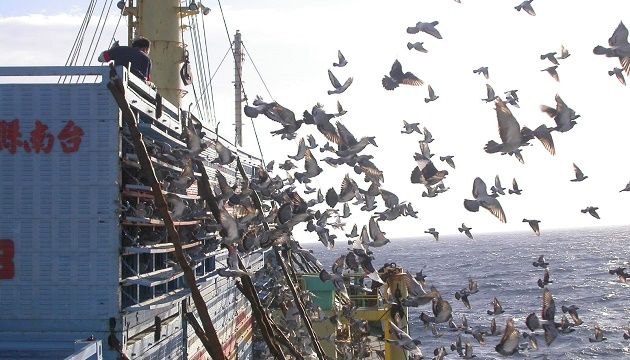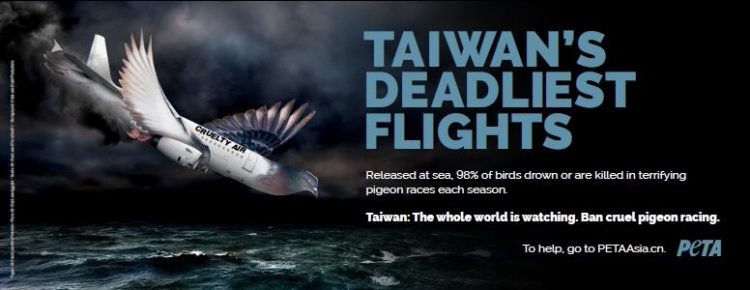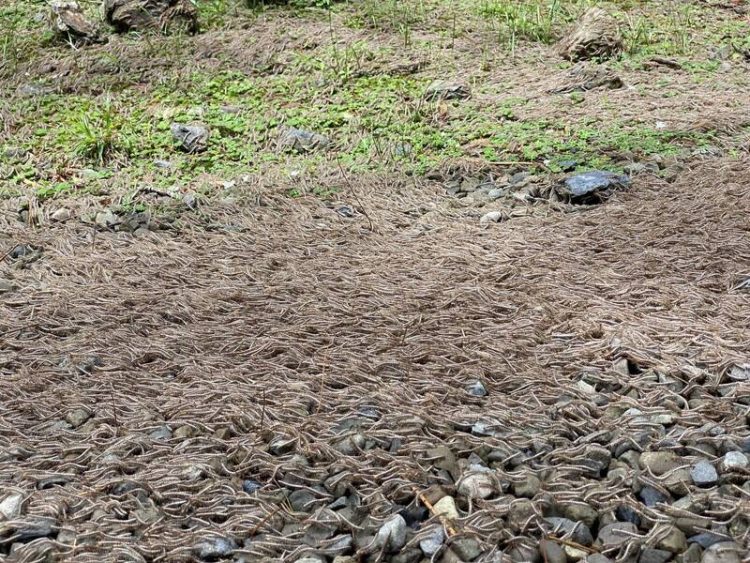Every year, more than a million pigeons die while competing in Taiwan’s controversial pigeon sea races, a series of grueling events in which young birds are shipped far out to sea, released in the middle of nowhere and forced to fly home. According to several reports from animal rights organizations, less than 1% of them make it back to land.
The small island of Taiwan hosts more pigeon racing events than any other country in the world. A reported 500,000 Taiwanese race pigeons every year, competing for billions of New Taiwan dollars in prize money. Pigeon racing is such a big business that the National Pingtung University of Science and Technology once introduced an optional course on it, which proved very popular with both young and old pigeon racers. However, important notions taught during this course, like injury prevention and the use of performance enhancing drugs fly out the window during Taiwan’s seasonal sea races.

Photo: 101Newsmedia
PETA first blew the lid off Taiwan’s cruel pigeon sea races in 2014, when undercover investigators managed to record the horrors that occur during these profitable events. Tens of thousands of birds are crammed together into cargo crates, shipped far out into the ocean by fishing boats and released to see which ones make it back home the fastest. Some drop into the water right after being released, after crashing into each other or into the boat, while the rest succumb to fatigue, or typhoon-strength winds. Out of the millions of pigeons competing in several of these grueling races every year, less than 1% make it back home.
“It was raining pigeons—literally. I’ve never seen such a scene. … Every one of them crashed onto the boat. … Some crashed into the ocean,” a Taiwanese fishing boat captain was quoted as saying in a PETA report. “About one hour after the pigeon rain, you could see the whole surface of the ocean filled with dead pigeons.”
The multi-billion dollar pigeon racing scene in Taiwan is so competitive that many participants rely on all kinds of shady tactics to increase their chances of success. Many racers drug their birds with little concern for their health, while others try to doctor the birds’ leg ring numbers or even kidnap favorites and hold them for ransom.

Photo: PETA
PETA’s 2014 report on the ruthless pigeon sea races made quite an impact at the time, prompting the Taiwanese Government to finally intervene and raid some of the island’s biggest pigeon racing clubs. In 2015, Taiwan News reported that police seized around NT$120 million (US$3.62 million) in assets and confiscating computers and other equipment from such clubs. A total of 164 people were charged with gambling on pigeon races, including the president of the Fengyuan Pigeon Club.
However, the Government crackdown didn’t stop pigeon racers from forcing their birds to competing in these deadly sea races. While the mainstream media seems to have dropped the topic completely in the last few years, there is evidence that Taiwan’s seasonal pigeon sea races are still taking place.
In June of last year, the crew of an Australian dredge discovered that a struggling pigeon had hitched a ride on their vessel. Upon closer inspection, they discovered that the inside of its wings had been tattooed with colorful symbols and Chinese characters.
“We just thought they were stamps. But we looked it up — it had three tags on its feet — we found it was some big bird race they have in Taiwan,” a dredge operator told ABC News.
The bird had presumably been blown off course by strong winds and was lucky enough to find a ship to rest on before it crashed into the ocean from exhaustion.
Also in 2017, Taiwanese pigeon racing club Zhong Zheng Club of Kaohsiung reported only 147 survivors out of the 12,423 pigeons registered in last year’s summer and fall races, according to PETA. That’s actually over 1% survival rate, so I guess it can be called an improvement…
Unfortunately, even those that do make it back are sometimes killed by their owners if they aren’t fats enough to win them prizes.






